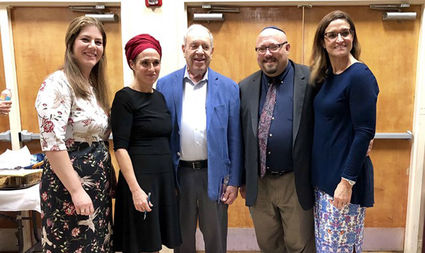Terror attack survivor praises Rescuers Without Borders
November 23, 2018
Three minutes. That is all the time it took for an Arab terrorist to stab to death Michal Salomon's husband, Elat, his sister Chaya, and father, Yosef. The story of her family's tragedy was covered by many news sources as the Neve Tzuf massacre worldwide in July 2017.
Salomon calmly recounted the events at a gathering held at the Roth Family JCC last Wednesday evening. She lived because she rushed her three children upstairs to a bedroom where her twin babies were sleeping.
The terrorist, Omar al-Abed of nearby town Kobar, chose the home in Halamish where he "heard laughter." The family was celebrating Shabbat and the birth of another grandchild for Yosef and Tovah.
Michal stood in the bedroom pressed against the door. Her children-ages 11, 9 and 5 at the time-sat quietly, not making a sound. After a few minutes, she heard gunfire and then nothing. She cautiously went downstairs and saw Elat breathe his last breath. Her father-in-law and sister-in-law were dead in the kitchen where a wounded al-Abed was being held until security officers could arrive. A neighbor, an off-duty IDF soldier, who heard the screams came running over to the house and shot al-Abed through the window.
Asked how she could remain so calm and at peace as she spoke, Michal explained that she realized that she was suddenly left to raise five children on her own without her husband of 13 years beside her and knew she had to raise her children to be "normal."
"I chose to focus on my children and my life and not that person," she said.
Michal has been sharing her story for almost a year now to help bring awareness to the incredible Rescuers Without Borders-the Hatzalah-of Judea and Samaria. She travels with Natalie Sopinsky, director of Development of Hatzalah. Together, the women share the miraculous stories of the more than 800 volunteer medics, paramedics and physicians on call throughout Judea and Samaria who work hand-in-hand with the Magen David Adom, and in coordination with the IDF.

Here in Central Florida, we have hospitals every 10 miles, interspersed with urgency care centers. A call to 911 is responded to quickly. In Israel, first responders come quickly if one lives in a big city. In Judea and Samaria it is a different story because the towns are small and scattered about, often with Arab villages surrounding them. Michal praised Rescuers Without Borders for saving her mother-in-law's life. Rescuers arrived quickly and treated her stab wounds before rushing her to Shaare Zedek Medical Center in Jerusalem-a 40-minute drive from Halamish. Had there not been volunteer first responders, Tovah probably would not have made it.
Rescuers Without Borders is a volunteer organization. While they operate throughout Israel, they concentrate in areas of conflict such as Judea and Samaria and the towns near Gaza. Volunteers train for 15 hours a week for six months-this is in addition to the 40-hour week jobs many hold.
The group was founded in 2000 during the Second Intifada by security officers who with MDA started asking for volunteers to train as medics.
"We are not going to run away. We are here to stay," said Sopinsky. "This is one way we fight back."

RWB is not government-funded. It is privately funded, which actually allows the group more freedom of movement. More than 1,000 lives are saved annually. RWB was on the scene immediately after Ari Fuld was stabbed; a rescuer responded to a call from a woman in labor on the way to the hospital on a dangerous road in Samaria, and delivered a healthy baby boy; a small child was severely burned by a Molotov cocktail thrown at her family's car. Rescuers prompt arrival saved the child's life. These are only three stories of the daily instances of emergency help provided by these volunteers.
The pair spoke in New York where they also met with Israeli Consul Danny Dayon to discuss the important work carried out by Rescuers Without Borders, and Miami where they spoke before more than 1,000 women at the Miami Federation Women's Brunch. Dr. Daniel and Staci Layish hosted the pair here to share about RWB and its "wish list." Philanthropist Alan Ginsburg, who attended the meeting, was asked if he planned to donate to RWB, he responded "Yes I am!"
In addition to needing more Jews to come live in Israel, Sopinsky said the most important need is a security room. Every yishuv (settlement) in Judea and Samaria has a security chief and a first response team made up of civilians of the yishuv. Some yishuv have only one responder, some have several. The security room serves as a surveillance station and communications center. The cost is $50,000 for a fully equipped room.
Other needs include:
Ambulance, $120,000
Advanced Life Saving Kits (which include resuscitation kit, a burn kit and a defibrillator), $3,600 per unit
Basic Life Saving Kits, $1,200 per unit
Defibrillator, $1,800 per unit
Armored Medic Vests, $1,200
Rescuers Without Borders is directly coordinated with the national emergency services. If someone is injured he can dial the national emergency number (101) and the RWB volunteers are the first to arrive.
To donate to Rescuers Without Borders, checks made out to Hatzalah Yehuda and Shomrom, can be mailed to 492 Cedar Lane #184, Teaneck, NJ 07666, or in Israel, Givon 108/3 P.B. 10053, Givat-Zeev, Israel 90917 or visit http://www.hatzalah.org.il/en/donate.
Hatzalah Yehuda and Shomrom is a 501 ©(3) US nonprofit charitable organization; tax ID 31461.




Reader Comments(0)